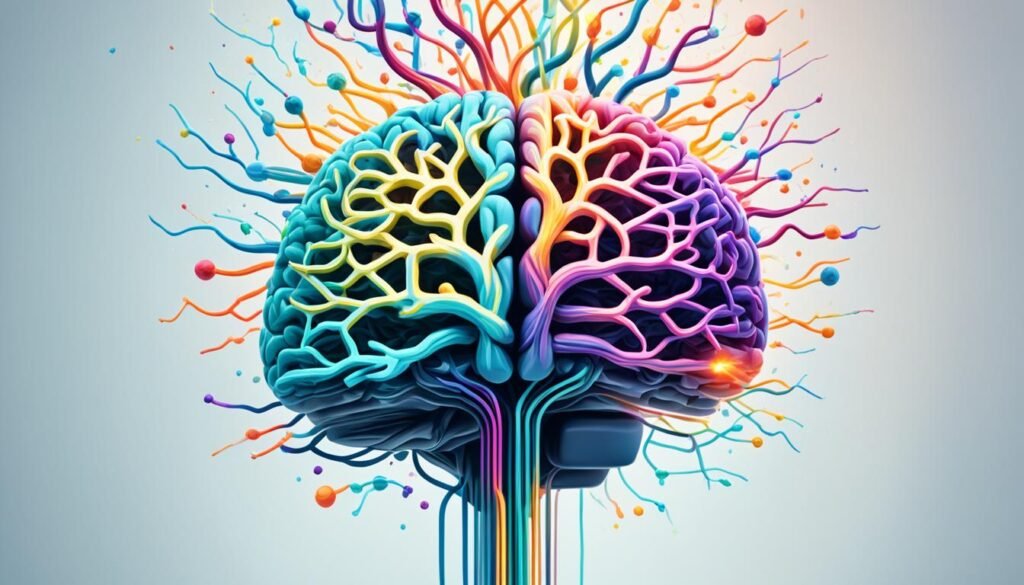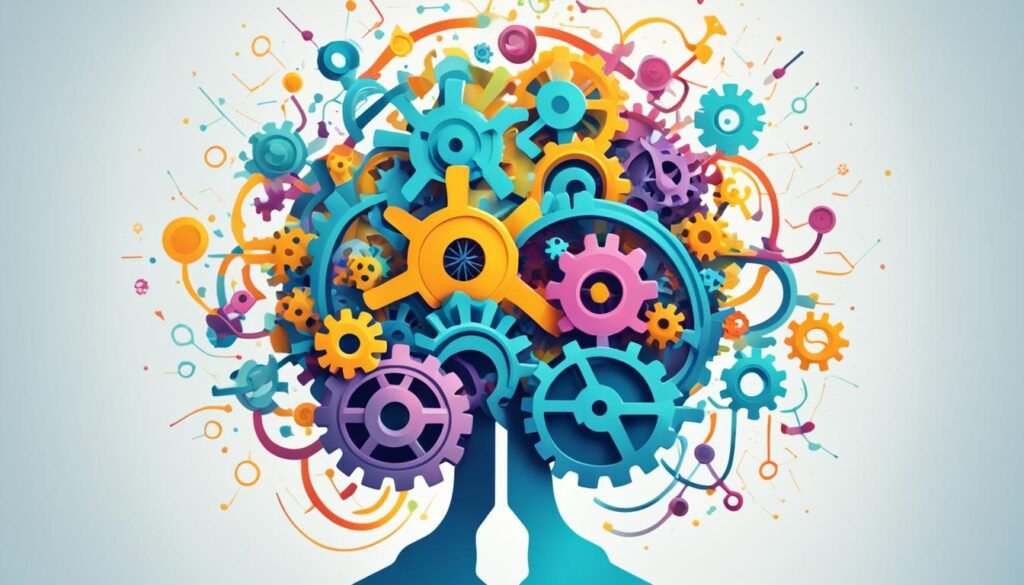Cognitive function is the cornerstone of our mental capacity, encompassing a range of abilities such as attention, memory, decision-making, and problem-solving. By understanding and optimizing these cognitive skills, you can unlock your full potential, enhance your productivity, and achieve sharper thinking in every aspect of your life. This comprehensive guide will provide you with expert tips and strategies to improve your cognitive function, from boosting your executive function to enhancing your memory recall and processing speed.
Throughout this article, we will delve into the key components of cognitive function, offering practical techniques to strengthen your attention span, working memory, and cognitive flexibility. We’ll also explore the impact of lifestyle factors, cognitive training, and aging on your mental performance, equipping you with the knowledge and tools to maintain and improve your cognitive health throughout your life.
Key Takeaways
- Cognitive function encompasses a range of mental abilities, including attention, memory, decision-making, and problem-solving.
- Optimizing your cognitive function can enhance your overall mental performance and productivity.
- Strategies for improving cognitive function include enhancing executive function, boosting memory recall, and increasing processing speed.
- Lifestyle factors such as nutrition, exercise, and stress management play a crucial role in maintaining cognitive health.
- Regular cognitive training and engagement in brain-stimulating activities can help maintain and improve cognitive abilities.
Understanding Cognitive Function
Cognitive function refers to the various mental processes that enable us to perceive, learn, remember, and problem-solve. It encompasses a range of abilities, including attention, memory, language, decision-making, and executive function. Understanding the different components of cognitive function is the first step in developing strategies to improve and maintain these vital mental abilities.
What is Cognitive Function?
Cognitive function is a broad term that describes the various mental processes that allow us to interact with the world around us. This includes the ability to focus our attention, store and retrieve information in our memory, understand and use language, make decisions, and solve complex problems. These cognitive abilities are essential for navigating our daily lives and achieving our personal and professional goals.
The Importance of Cognitive Abilities
Cognitive function is crucial for our well-being and success in life. By optimizing our cognitive abilities, we can enhance our productivity, decision-making skills, and overall mental performance. Strong cognitive function enables us to effectively process information, learn new skills, and adapt to changing circumstances. It also plays a vital role in maintaining our independence and quality of life as we age. Recognizing the importance of cognitive function is the first step towards taking proactive steps to improve and maintain these essential mental capacities.
Enhancing Executive Function
Executive function is a crucial set of cognitive abilities that enable us to plan, organize, and regulate our thoughts and actions. By honing these skills, we can unlock heightened levels of productivity, problem-solving, and decision-making. Let’s explore three key strategies for enhancing executive function and sharpening our mental acuity.
Improving Attention Span
In today’s fast-paced world, maintaining focused attention can be a challenge. To boost your attention span, try incorporating mindfulness practices into your daily routine. Engaging in regular meditation or mindfulness exercises can train your brain to stay present and resist the lure of distractions. Additionally, breaking down complex tasks into smaller, manageable steps can help you sustain your focus and complete projects more efficiently.
Boosting Working Memory
Working memory is the cognitive capacity to hold and manipulate information in our minds. Strengthening this ability can have a profound impact on our overall cognitive performance. One effective strategy is to engage in mentally stimulating activities, such as brain games, puzzles, or learning a new skill. Challenging your brain to retain and process information can help improve your working memory over time.
Developing Cognitive Flexibility
Cognitive flexibility refers to our ability to adapt our thinking and shift our perspectives in response to changing circumstances. Cultivating this skill can enhance our problem-solving capabilities and decision-making processes. Techniques like practicing divergent thinking, experimenting with different approaches to tasks, and consciously considering multiple viewpoints can all contribute to developing greater cognitive flexibility.
By focusing on improving attention span, boosting working memory, and fostering cognitive flexibility, we can enhance our executive function and unlock new levels of cognitive performance. Incorporating these strategies into our daily lives can lead to sharper thinking, more effective decision-making, and greater overall success in both our personal and professional endeavors.
Optimizing Memory Recall
Memory recall is a crucial component of cognitive function, allowing us to effectively store and retrieve information as needed. Fortunately, there are several techniques you can employ to enhance your memory retention and recall abilities. One powerful strategy is to create mnemonic devices, which are memory aids that associate new information with familiar concepts or images. By forming these memorable connections, you can improve your ability to recall important details and facts.
In addition to mnemonic devices, practicing active recall is another highly effective method for boosting memory performance. This involves actively retrieving information from your memory, rather than passively reviewing it. Engaging in regular review and repetition of key information can further solidify your ability to recall it when necessary.
Maintaining a healthy lifestyle can also significantly contribute to optimizing your memory recall. Ensuring you get adequate sleep, maintaining a balanced nutritious diet, and employing effective stress management techniques can all have a positive impact on your memory function. By addressing these foundational aspects of cognitive health, you can create an environment that supports and enhances your memory capabilities.

Increasing Processing Speed
Processing speed refers to the efficiency with which the brain can take in, process, and respond to information. Improving processing speed can lead to quicker decision-making, enhanced problem-solving abilities, and increased productivity. By implementing targeted strategies and engaging in regular practice, you can boost your cognitive processing speed and unlock a host of benefits in your personal and professional life.
Strategies for Faster Information Processing
One effective way to increase processing speed is through cognitive training exercises that challenge your brain to work faster and more efficiently. These exercises can involve tasks that require rapid information processing, such as memory games, pattern recognition activities, or problem-solving challenges. By regularly engaging in these types of activities, you can train your brain to process information at a quicker pace.
Another strategy for boosting processing speed is to incorporate mindfulness techniques into your daily routine. Mindfulness practices can help reduce cognitive load and improve focus, allowing your brain to process information more efficiently. Simple exercises like deep breathing, meditation, or even taking short breaks to practice mindfulness can have a significant impact on your processing speed.
The Role of Practice and Repetition
Consistent practice and repetition are key to developing faster information processing capabilities. The more you engage in activities that challenge your cognitive abilities, the more your brain will adapt and become more efficient at these tasks. Over time, you’ll notice that your reaction times improve, and you can process information more quickly and effectively.
By combining cognitive training exercises, mindfulness practices, and regular practice, you can unlock the full potential of your processing speed and enjoy the benefits of sharper thinking, quicker decision-making, and enhanced problem-solving abilities.
Cognitive Function and Decision Making
Cognitive function plays a vital role in our decision-making processes. By optimizing cognitive abilities such as attention, memory, and problem-solving, we can make more informed and effective decisions. This section explores techniques for enhancing problem-solving skills and overcoming the impact of cognitive biases on our choices.
Enhancing Problem-Solving Skills
Effective problem-solving is a cornerstone of sound decision-making. To enhance your problem-solving abilities, try breaking down complex issues into smaller, more manageable components. Consider multiple perspectives and alternatives before reaching a conclusion. Additionally, utilize structured decision-making frameworks, such as the OODA loop (Observe, Orient, Decide, Act), to systematically approach and solve problems.
Overcoming Cognitive Biases
Cognitive biases can significantly influence our decision-making, leading us to make suboptimal choices. To overcome these biases, it’s crucial to develop self-awareness and a willingness to challenge our assumptions. Techniques such as devil’s advocacy, where you actively seek out and consider opposing viewpoints, can help mitigate the impact of biases like confirmation bias and anchoring. Additionally, incorporating de-biasing strategies, such as considering a wide range of options and actively seeking out disconfirming evidence, can improve the quality of our decisions.
The Impact of Lifestyle on Cognitive Function
Maintaining a healthy lifestyle is crucial for optimizing cognitive function and preserving mental sharpness throughout our lives. This section explores the profound influence that various lifestyle factors, such as nutrition, physical activity, and stress management, can have on our cognitive abilities.
Nutrition and Brain Health
A balanced and nutrient-rich diet plays a pivotal role in supporting cognitive function. Certain foods, such as omega-3 fatty acids, antioxidants, and B vitamins, have been shown to nourish the brain and enhance various cognitive processes, including memory, attention, and problem-solving. By incorporating these brain-boosting nutrients into your daily meals, you can fuel your mind and promote overall cognitive health.
Exercise and Cognitive Performance
Regular physical activity has far-reaching benefits for cognitive function. Exercise not only enhances cardiovascular health but also stimulates the growth of new brain cells and strengthens neural connections. Engaging in aerobic exercise, strength training, and activities that challenge cognitive flexibility can all contribute to improved memory, processing speed, and executive function. Incorporating a diverse exercise regimen into your lifestyle can be a powerful tool for optimizing cognitive performance.
Stress Management Techniques
Chronic stress can have a detrimental impact on cognitive function, impairing memory, attention, and decision-making. Effective stress management techniques, such as mindfulness meditation, deep breathing exercises, and relaxation practices, can help mitigate the negative effects of stress and promote a calm, focused mind. By incorporating these strategies into your daily routine, you can enhance your cognitive abilities and maintain mental well-being.
Cognitive Training and Brain Games
In the pursuit of improving cognitive function, engaging in targeted cognitive training exercises and brain games has become a popular approach. These interactive activities offer a range of benefits, from enhancing specific mental abilities to promoting overall brain health.
The Benefits of Cognitive Training
Cognitive training programs are designed to challenge and strengthen various cognitive skills, such as attention, memory, and problem-solving. By regularly engaging in these structured exercises, individuals can experience tangible improvements in their cognitive performance. Research has shown that cognitive training can lead to better focus, enhanced memory recall, and increased problem-solving capabilities, all of which contribute to sharper overall thinking and decision-making.
Choosing the Right Brain Games
With the abundance of brain games and cognitive training applications available, it can be daunting to find the right ones that align with your personal goals and needs. When selecting brain games, it’s essential to choose those that are scientifically validated and tailored to your specific cognitive strengths and weaknesses. Look for games that target the cognitive abilities you wish to improve, whether it’s attention, memory, or processing speed, and ensure they are designed by reputable developers with a track record of efficacy.
Incorporating cognitive training and brain games into your routine can be a powerful way to enhance your cognitive function and unlock your full mental potential. By committing to regular practice and selecting the right tools, you can experience tangible improvements in your attention, memory, and problem-solving skills, ultimately leading to a sharper, more resilient mind.
Cognitive Function and Aging
As we navigate the natural progression of life, our cognitive function can undergo subtle changes, which may include declines in memory, processing speed, and executive function. However, this section highlights an important truth: cognitive decline is not an inevitable consequence of aging.
Understanding Cognitive Decline
Several factors can contribute to age-related cognitive decline, including lifestyle choices, medical conditions, and genetic predispositions. Poor diet, sedentary behavior, chronic stress, and certain health issues can all negatively impact cognitive abilities over time. Understanding the drivers of cognitive decline is the first step in combating its effects.
Strategies for Maintaining Cognitive Health
The good news is that with the right approach, we can actively promote cognitive health and combat the natural effects of aging. Engaging in regular physical activity, stimulating the mind with cognitive exercises, and fostering social connections are all evidence-based strategies for maintaining cognitive function as we grow older. By adopting a lifestyle that supports brain health, we can unlock the potential for successful aging and preserve our mental sharpness well into our golden years.
Cognitive Function in the Workplace
In the fast-paced and ever-evolving workplace, cognitive function plays a crucial role in determining individual and organizational success. By optimizing cognitive abilities, employees and employers can unlock new levels of productivity, decision-making, and overall performance.
Enhancing Productivity and Focus
One of the key ways to harness the power of cognitive function in the workplace is by improving focus and minimizing distractions. Techniques such as practicing mindfulness, implementing task-batching strategies, and leveraging productivity-enhancing tools can help employees maintain a heightened state of attention and concentration, leading to more efficient and effective work output.
Improving Cognitive Performance at Work
Beyond enhancing productivity, optimizing cognitive function can also lead to better problem-solving skills, more informed decision-making, and enhanced creativity. Employers can foster an environment that supports cognitive health by encouraging regular breaks, providing access to cognitive training resources, and promoting healthy lifestyle habits among their workforce. When employees are equipped with the cognitive tools they need to thrive, the entire organization benefits.

By prioritizing cognitive function in the workplace, businesses can cultivate a culture of mental agility, resilience, and innovation, ultimately driving success in an increasingly competitive landscape.
The Role of Sleep in Cognitive Function
Sleep is a fundamental aspect of cognitive function, as it plays a vital role in memory consolidation, information processing, and neural plasticity. Research has shown that sleep deprivation of one or more nights without sleep can slow down reaction times and lack of sleep can increase perseveration. Furthermore, insufficient sleep can reduce focused attention, while sleep loss impairs risk assessment and strategic planning.
On the other hand, subjects who sleep after learning perform better on subsequent retrieval tests than those who stay awake following learning. This highlights the importance of sleep in memory consolidation and the subsequent acquisition of new learning material. In fact, studies have found that short periods of sleep before learning can enhance the capacity to encode new information, with the firing sequences of hippocampal place cells observed during training replaying in a coordinated fashion during subsequent sleep periods.
To optimize cognitive function, it is essential to prioritize getting adequate, high-quality sleep. This can be achieved by establishing a consistent sleep schedule, creating a sleep-conducive environment, and practicing relaxation techniques, such as mindfulness or meditation, before bedtime. By incorporating these strategies, you can contribute to enhanced cognitive abilities, including improved memory, attention, and problem-solving skills.
Conclusion
In the end, improving cognitive function is a multifaceted endeavor that requires understanding the various components of cognitive abilities, implementing targeted strategies, and adopting a lifestyle that supports brain health. By incorporating the tips and techniques outlined in this comprehensive guide, you can enhance your executive function, memory, processing speed, and decision-making skills, leading to sharper thinking and greater overall cognitive performance.
Remember, cognitive function is not fixed – it is a dynamic process that can be optimized with dedication and consistent effort. With the right mindset and action plan, you can unlock your full mental potential and achieve your personal and professional goals. So, embrace the opportunity to enhance your cognitive function and unlock new levels of productivity, problem-solving, and personal growth.
The key is to approach this journey with a growth mindset, continuously learning, and experimenting with different strategies to find what works best for you. By doing so, you’ll not only improve your cognitive function but also cultivate a lifelong habit of mental well-being and personal empowerment.


